Today's Pangolins - A revelation of different destinies
AN UNUSUAL VISITOR
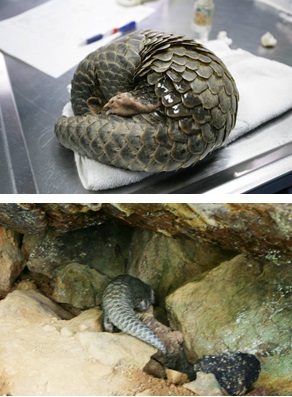
(Below) The pangolin is released back to its natural habitat
Exciting news buzzed through the Rescue Centre! On 21st May, 2011, our staff on duty were very thrilled to receive a call from the Hong Kong Police reporting the discovery of a live pangolin, that was on its way to the Wild Animal Rescue Centre.
The pangolin was discovered near a service road in Tai Po by a member of the public, who then rang up the Police. The animal was sent to the Rescue Centre for a health check. It was an adult male, and arrived in good shape. After conducting a thorough veterinary examination, the rescue staff released the pangolin back to the wild on the afternoon of the same day.
'It was in good condition and looking very bright. To minimise human contact with the pangolin and to allow it to quickly re-adapt to its natural surroundings, we decided to release it straight away,' said Tan Kit Sun, KFBG Senior Conservation Officer.
'It's good to know that they are still out there, and it's really exciting to see a live one. It's been nine years since the Rescue Centre last received a live Chinese Pangolin.'
THE REALITY IS…
Not all pangolins are so lucky! In Asia, pangolins face loss of habitat and severe threats from poaching. They are hunted down for their meat and scales, which are made into a powder as an ingredient in the Traditional Chinese Medicines. Illegal wildlife trafficking has been so rampant that the Asian species are quickly disappearing in the wild.
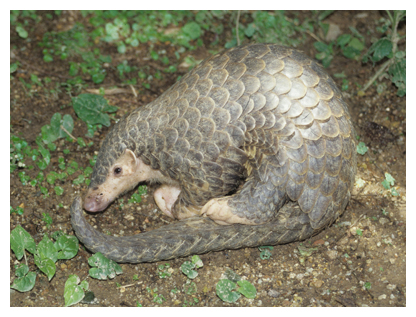
SCALY ANTEATERS
Pangolins are scaly anteaters. They are burrowing mammals found in Asia and Africa. There are eight pangolin species in the world, and Hong Kong is home to the Chinese Pangolin (Manis pentadactyla). Its distribution ranges from the Himalayan regions to South and Southeast Asia.
It is currently listed as Endangered (EN) by the International Union for Conservation of Nature (IUCN) Red List, and is also listed on Appendix II of the Convention on International Trade in Endangered Species of Wild Fauna and Flora (CITES), but with a zero quota, i.e., no international commercial trade is permitted for the species.
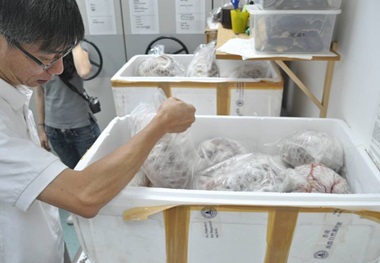
SAME ANIMAL, DIFFERENT FATES
In early April 2011, the Hong Kong Customs and Excise Department intercepted a large shipment of 202 pangolins, all frozen and de-scaled. It is believed that they were smuggled from Indonesia and destined for mainland China.
'It was horrifying to see these gentle and unique animals killed in such a cruel way,' sighed Dr. Michael Lau, KFBG Senior Conservation Officer. ‘Some of them were so small that they must have been babies clinging to their mother’s back and had been caught and killed together. Even a caring mother with body armour perfected through millions of years of evolution cannot be saved from persecution by humans.'
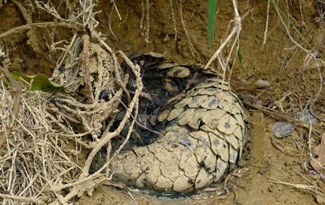
(Left) Trapping is illegal in Hong Kong; animals caught in a gin trap suffer a slow and agonizing death.
About a month later, Michael Lau encountered another dead pangolin as he was carrying out a survey for illegal turtle traps in the New Territories. It was caught in a gin trap. 'It must have died a very slow and painful death from the loss of blood from its leg injury and infections to the wound. The hunter who laid the trap was targeting pangolins as it was placed close to its burrow. The hunter was probably trapping over a wide area and did not bother to check the traps regularly.‘
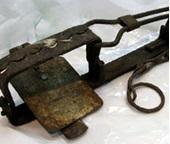
With the growing demand for exotic wildlife in South China, I am worried about the possibility of a surge in illegal trapping in our countryside. It's just sad and outrageous,’ said Michael. Chinese Pangolins are protected by law in Hong Kong and it is also illegal to do any hunting or to carry out trapping activities.
HOW YOU CAN HELP
Extinction is forever, once the species is gone, there is no way we can bring it back to life. Think twice before you purchase or consume any wildlife products.
Do report to the Agriculture, Fisheries and Conservation Department (AFCD) at (852) 2150 6978 or KFBG at (852) 2483 7136 / (852) 6713 9881 if you discover any illegal wildlife trade and trapping activities.
Do your part to help save our wildlife.
You may download the PDF of this article from here.


